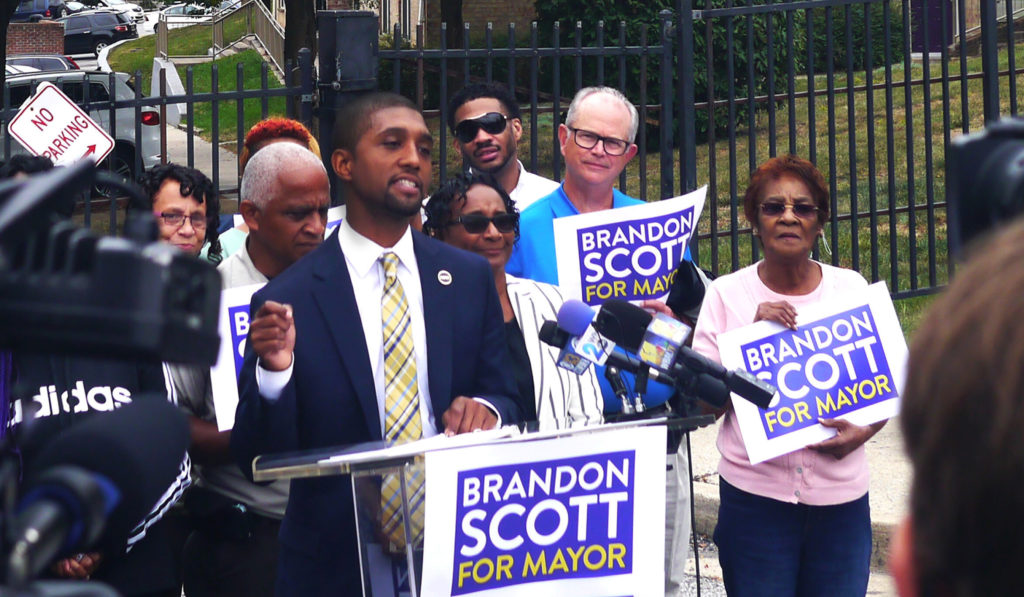The results of Baltimore’s June 2 primary election—mostly done via mail and then seriously mishandled by the Baltimore City Board of Elections—are finally in as of last week and they suggest some potential change in the city when it comes to cannabis (in Baltimore, winners of the Democratic primary are presumed General Election winners).
Both Baltimore’s next mayor, Brandon Scott, and next City Council President, Nick Mosby, have been on the vanguard of local drug policy and have spoken out in favor of cannabis reform, equity, and legalization. While a 2019 Goucher poll showed that 57 percent of Marylanders support legalizing cannabis for recreational use while 37 percent oppose it, legalization for recreational adult use has not yet happened. A Maryland General Assembly Marijuana Legalization Workgroup convened in 2019 and did not recommend legalization. Significant cannabis legislation did not pass in 2020 due to the legislative session being shortened due to COVID-19.
In 2018, Scott was interviewed for “Structural Racism and Cannabis,” an investigative project published by the Baltimore Fishbowl, which I co wrote. There, Scott flatly said cannabis “should be legal.”
He added that legalization should ensure that those arrested for cannabis charges—who are disproportionately black— be allowed to be part of the legalized cannabis industry: “That’s a direct tie into allowing those who have been directly victimized by a system that has been focusing only on African-Americans to flip the script,” he said. More broadly, Scott has long been an advocate of harm reduction practices including not stigmatizing drug use or people who use drugs and has even been pushing for much bigger drug policy changes such as introducing overdose prevention sites to Baltimore.
The election of Scott, who is 36 years old, has been a member of City Council since he was 27, and is a progressive, is exciting after the resignation of Mayor Catherine Pugh, who is currently in federal prison for the “Healthy Holly” scandal. It is a sign of something like a new day, a shift against the entrenched corruption of the city. For example, even in this election, Scott barely eked out a victory against Sheila Dixon, who was mayor of Baltimore from 2007-2010 when she resigned due to corruption charges and ran again this year.
The exciting news also introduces another round of conflicts of interest. Nick Mosby, the new head of the City Council is the partner of Marilyn Mosby, head of the Baltimore City State’s Attorney’s Office. It is an arguably unprecedented conflict of interest for a major metropolitan city. Marilyn Mosby however, has also been a major advocate for drug reform. At the beginning of 2019, her office announced that they would no longer be prosecuting cannabis possession charges—no matter the amount. Marilyn Mosby has also spoken in favor of legalization.
Nick Mosby has framed cannabis legalization as inevitable in Maryland: “I think we’re just up against a clock,” Mosby told Baltimore Magazine. “The energy is there. I would not be surprised if it’s passed this term.” He was referring to the 2020 legislative session. Mosby was on the Marijuana Legalization Workgroup (he is currently a State Delegate and remains so until he takes office as Council President in 2021), which ultimately decided not to recommend legalization last year.
Last legislative session, Mosby also sponsored House Bill 350, a bill that would have increased the decriminalization threshold in Maryland from 10 grams to one ounce. That bill stalled, in part because the legislative session ended early due to COVID-19; the bill was apparently not considered a high priority. The Outlaw Report reached out to Mosby for comment on the stalled bill and received no comment.
Still, conflicts of interest aside, even as Maryland’s momentum for drug policy change appears to have slowed down—as The Outlaw Report has observed, Virginia has essentially caught up to Maryland this legislative session—there is a new simpatico relationship when it comes to cannabis reform among the mayor, head of City Council, and top city prosecutor.
Photo by Brandon Soderberg

